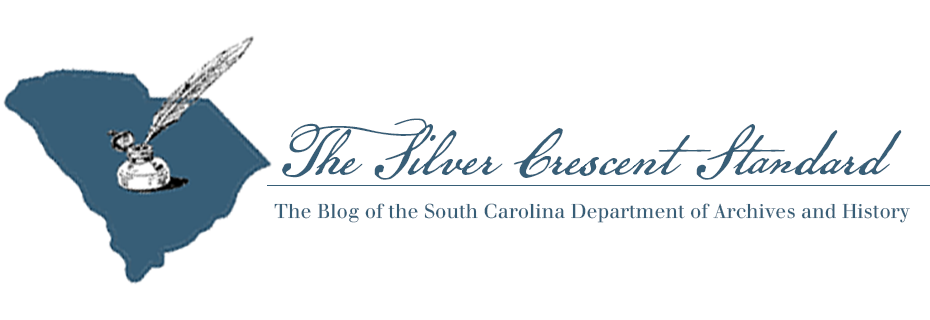
A Blog Post By Kathryn Slover
South Carolina’s contribution to the Civil Rights Movement is often overshadowed by national events. After Reconstruction, elected and appointed officials worked to undermine the gains African Americans in South Carolina had made since the Civil War. Black South Carolinians fought to regain those rights and more in the following decades. Through sit-ins, marches, and legal battles, South Carolina played an important part in the Civil Rights Movement.
The South Carolina Department of Archives and History (SCDAH) holds a variety of sources that can be useful in researching the Civil Rights Movement in South Carolina. Records at the SCDAH are arranged by record creators such as the Office of the Governor or the Department of Education (record groups) and then further arranged by the type of record within that record group by series such as press releases, correspondence, or financial records. We have created this list to help researchers navigate the different record groups and series they can explore to find primary sources related to the Civil Rights Movement.
Governor’s Records:
Governor’s Records contain a variety of useful sources that can assist in research about the Civil Rights Movement. Series for each governor can be found in our online Summary Guide. The quantity and type of records the SCDAH holds for each governor varies so it is important to read the description of each series to see if it might contain records pertaining to any subject you are researching. There might not be a clearly marked file of Civil Rights related materials, but looking at speeches from 1961, you may find a speech about a march or sit-in. Some useful series that may include information about the Civil Rights Movement are speech files, press releases, correspondence, executive orders, proclamations, and subject files.
Press Releases & Speeches – Press releases and speeches are official public statements from the Office of the Governor. This type of record is important for identifying the official opinion and actions of the governor on various topics or events.
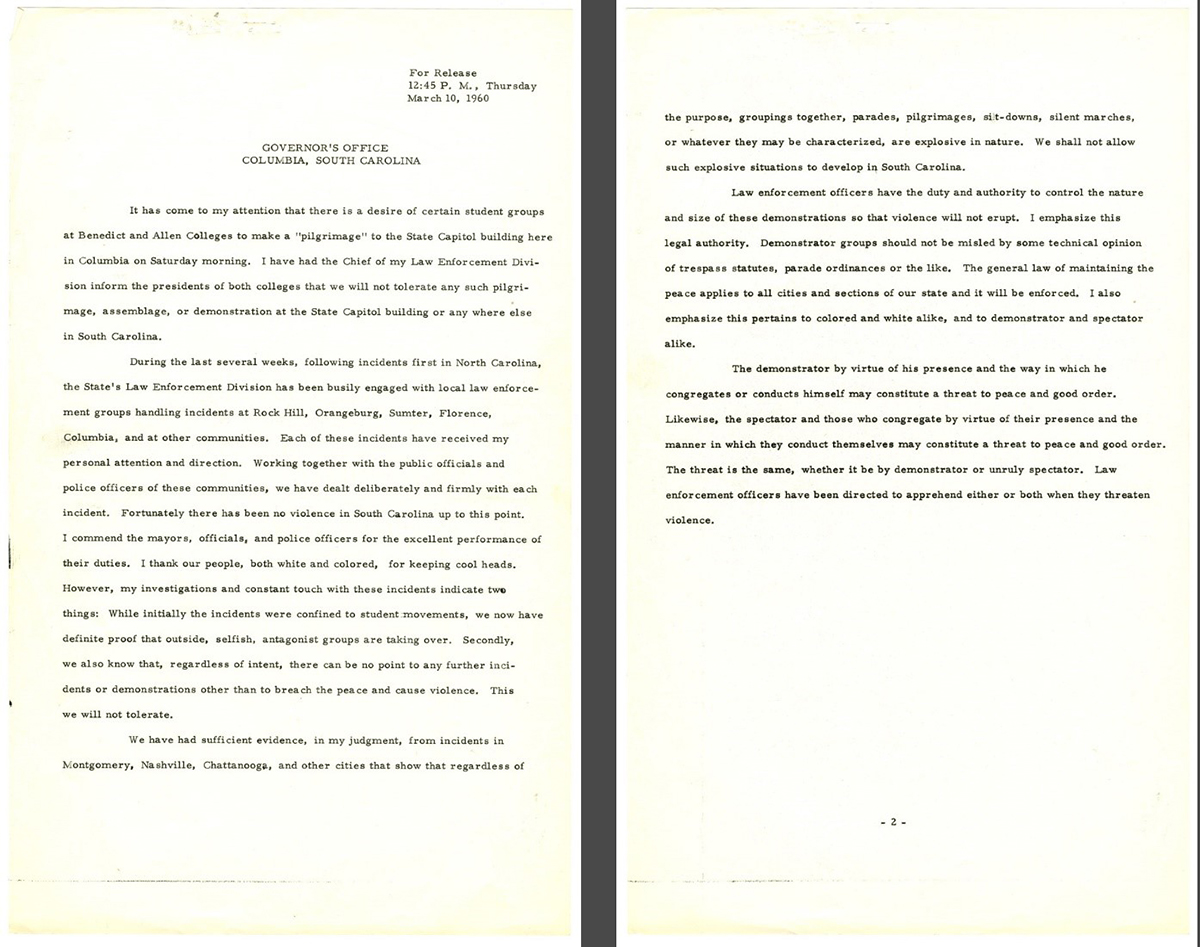
Correspondence
Governor’s correspondence can have rich information about many different topics. Correspondence series can include communication with other public officials, state agencies, and constituents. These records are especially useful because they can give insight into the personal views of the governors and those writing to them.
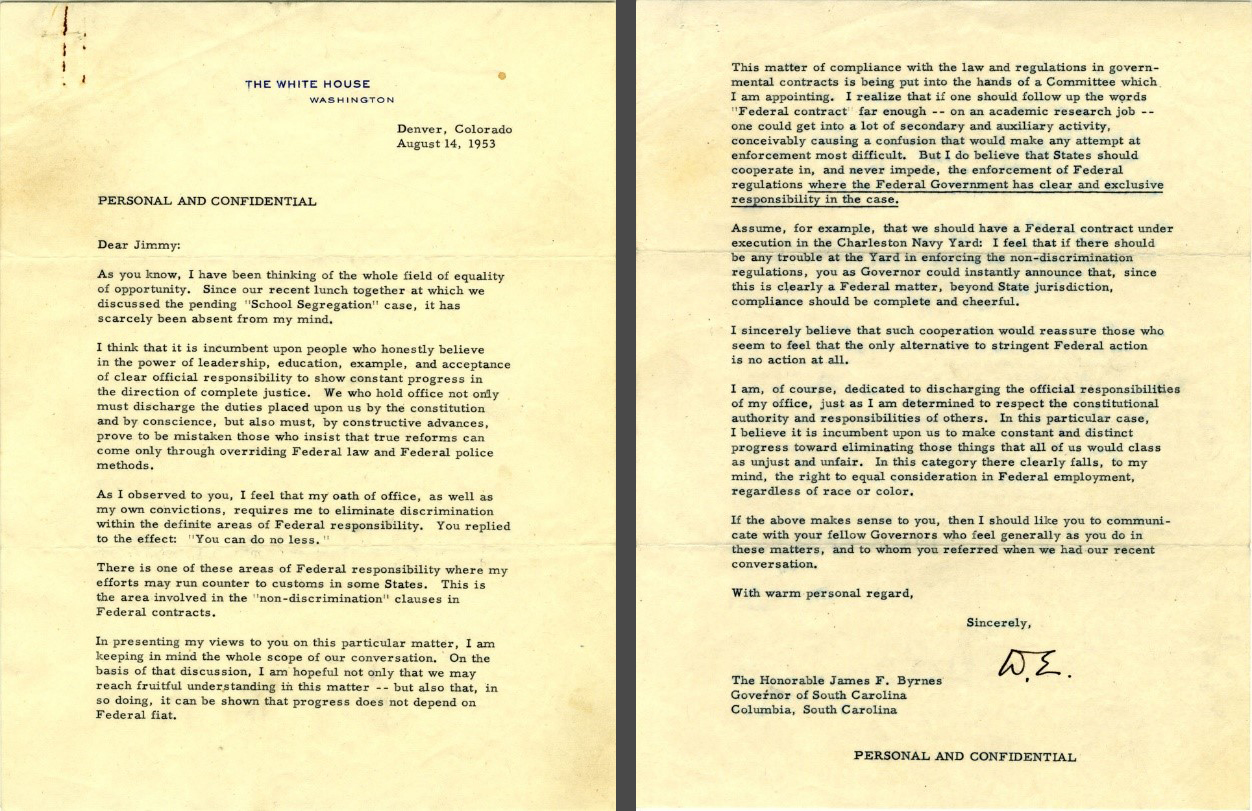
Subject files
This series was created as part of a filing system introduced into the Governor's Office in 1917 and was designed to hold recurrent records that did not accumulate as rapidly as those filed as separate series. These are extremely useful because they are usually arranged alphabetically by subject title so it can be easier to search based on a topic, event, person, etc.
Executive Orders and Proclamations
An executive order is a directive issued by the Governor of South Carolina that manages the operations of state government. Executive orders can pertain to a variety of different issues including civil rights. Proclamations are often used to honor and celebrate events as well as raise awareness about an issue. Proclamations and executive orders within a governor’s records can be their own series or they can be a subset of another series. For example, many subject files contain folders of proclamations.
Governor Byrnes Briggs v. Elliott file, 1951-1955 (S547018)
In addition to the series listed above, some governor’s records contain series dedicated to a specific subject or event. One example of this is the Briggs v. Elliot file in Governor James F. Byrnes’ records. This series is arranged by subject and contains information about the Briggs v. Elliot case that originated in Clarendon County and was submitted to the federal district court in Charleston on May 17, 1950. This case was eventually consolidated before the United States Supreme Court into Brown vs. Board of Education of Topeka.
Oral histories of the Robert E. McNair gubernatorial administration (1965-1971), 1979-1983 (P900176)
This series consists of audio tape recordings and transcripts of oral history interviews with thirty-eight persons in or closely connected with the administration of Gov. Robert E. McNair, 1965-1971. The transcripts cover most aspects of the governance, politics, economics, and history of the period. This series is the product of an oral history project that grew out of former Governor McNair's concern that his papers would not adequately document the Orangeburg Massacre on February 8, 1968, and the desire of a group of his associates to more thoroughly document his administration. The interviews are an excellent resource for researching the Orangeburg Massacre, specifically the interviews with Dr. M. Maceo Nance, Jr., President of South Carolina State College, and J. Preston Strom, the Chief of the State Law Enforcement Division (SLED). The transcripts of these interviews are available on the South Carolina Electronic Records Archive (SCERA).
Court Records:
Several important legal battles during the Civil Rights Movement were fought in South Carolina. Although many of these cases were fought in federal court, the SCDAH holds several series that can be useful in researching civil rights court cases. The Archives has South Carolina Supreme Court Opinions from 1933-1972 (S216004) and other local court records. One example of a local court series is the Clarendon County Board of Education Complaints Files (L14167), which contains records related to the origins of the Briggs vs. Elliott court case. You can view a digitized version of the original petition on the South Carolina Electronic Records Archive (SCERA).
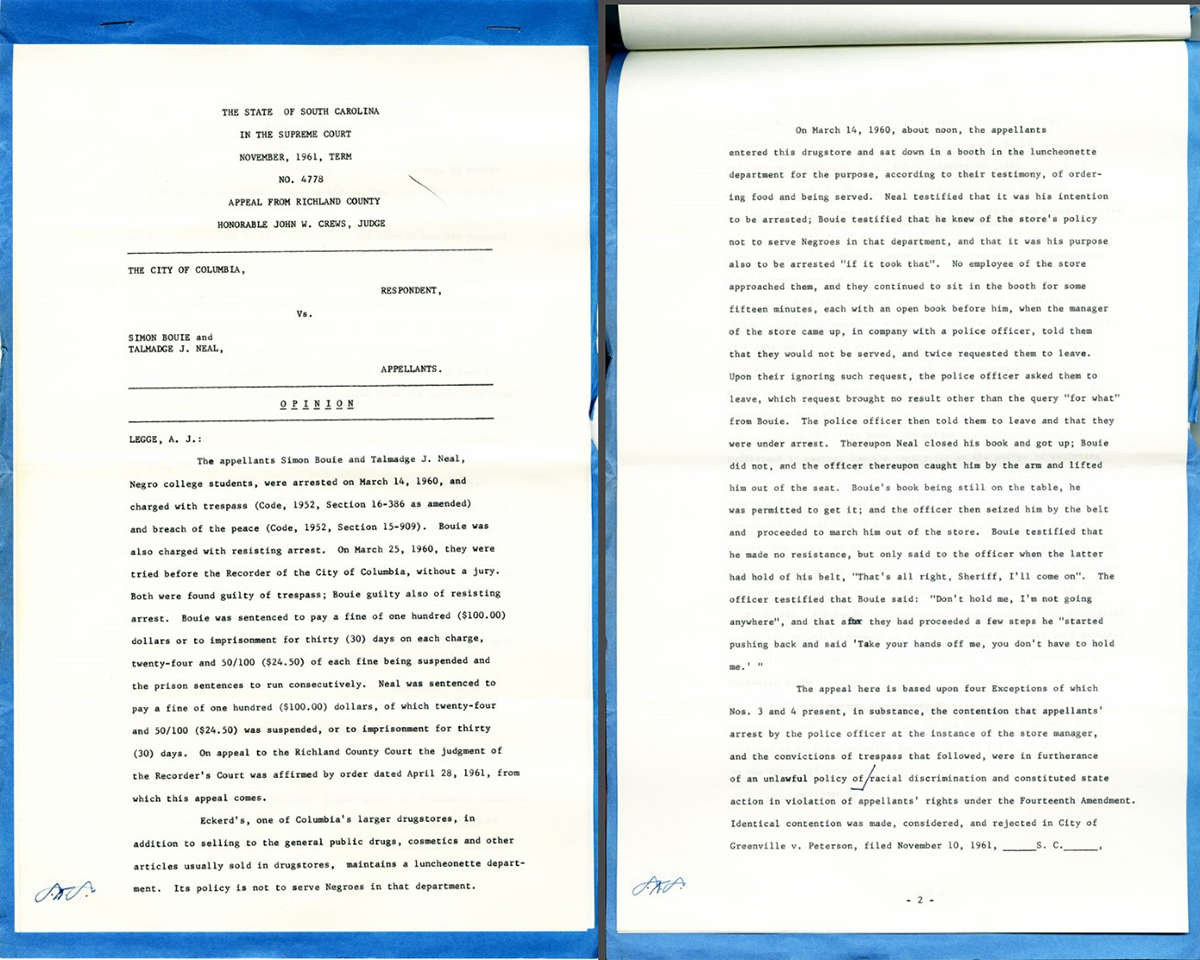
State & County Education Records:
Both state and county education records contain important information about the fight for equal education during the Civil Rights Movement and the push back from state and local governments. Series like meeting minutes, annual reports, correspondence, and records of the superintendent can all be useful in identifying records about segregation and “separate but equal” policies in the state. One example of this is the Dept. of Education State school scholarship grant program files series from 1963-1965 (S152172). This series consists of a file on the passage and implementation of an act of the S.C. General Assembly, passed in June 1963, authorizing the use of state funds to pay the tuition of students to attend private secondary schools in South Carolina. The file contains material relating to a suit filed by the U.S. Department of Justice challenging the act as intending to try to circumvent the forced integration of the state’s public schools. This series is just one example of the type of material state and county education records hold pertaining to civil rights.
Other Helpful Records:
You can also search our Online Catalog for key search terms like “desegregation”, “integration”, “discrimination”, etc. to see what is available. There are a few series that you can infer might be related to Civil Rights based on their titles. These include, but are not limited to, David W. Robinson papers (desegregation files) from 1954-1974 (P900182), Commission on Higher Education Desegregation of post secondary public education files from 1970-1991 (S170007), Attorney General Desegregation case files and transcripts from 1966-1968 (S110049), Horry County Desegregation files from 1965-1974 (L26115), and the State Park desegregation files from 1955-1956 (S162024). These are just a few series you can find by searching our Online Catalog. For more info on how to search our Summary Guide and Online Catalog visit our blog post on how to search both.
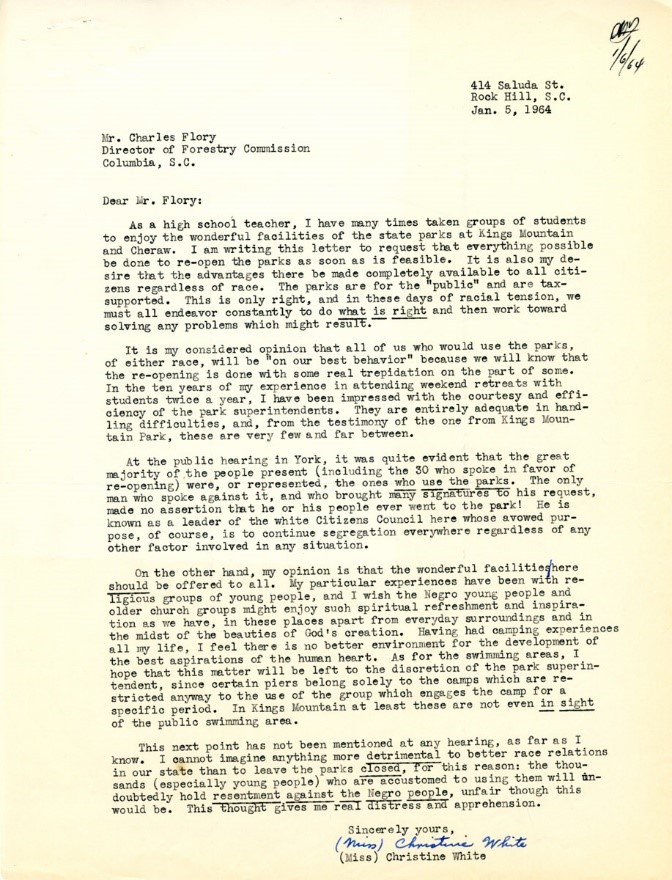
South Carolina Historic Properties Record (SCHPR):
The South Carolina Historic Properties Record (or SCHPR, pronounced “Skipper”) is an online searchable database of the South Carolina State Historic Preservation Office (SC SHPO) records on historic sites and built heritage, including sites related to the Civil Rights Movement. Through it users have access to three different types of records: historic property survey cards, National Register listing files, and historic resource survey reports. SCHPR is text searchable, meaning you can search for key words or phrases including, but not limited to, “Civil Rights,” “African American,” “equality,” “discrimination,” “segregation,” etc. You can also search for locations related to a specific individual by searching their name. For more info on how to search SCHPR visit our blog.
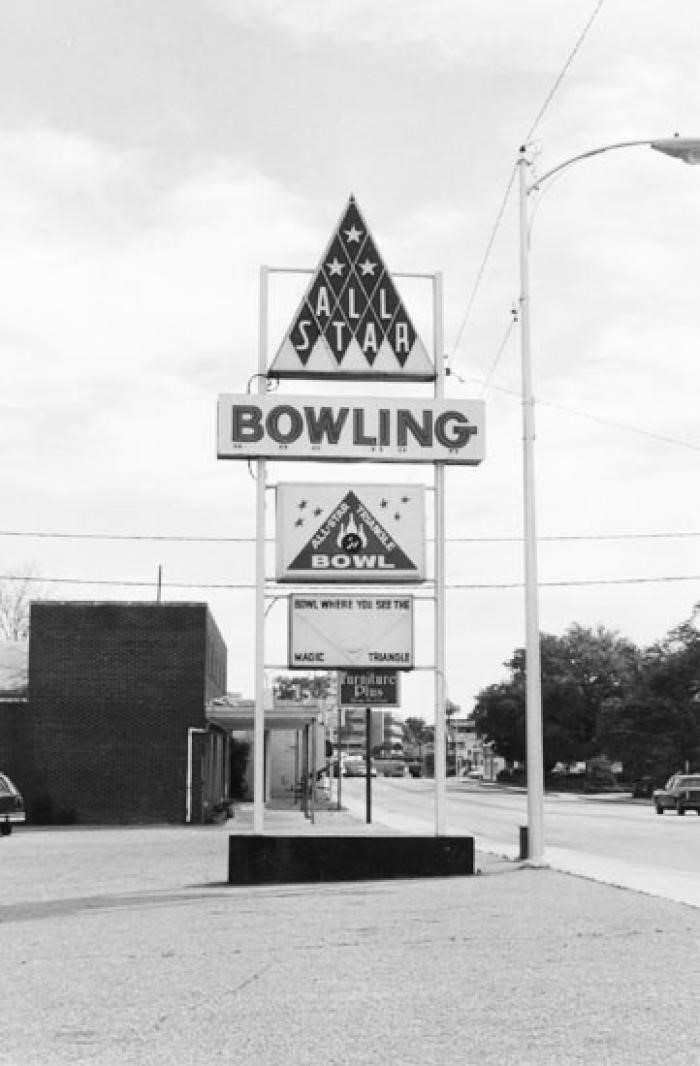
Additional Sources
These are only a few of the many resources that can help assist you in your research! If you are interested in a specific topic or event just contact our research staff and we can try to help you find the records you are looking for. The SCDAH Research Room also has a variety of secondary sources that can assist you in researching the Civil Rights Movement in South Carolina. For more info contact the SCDAH by submitting a research query here: https://scdah.sc.gov/research-and-genealogy/research-requests.
Although some records show the perspective of private citizens, documents at the SCDAH largely show the Civil Rights Movement from the perspective of the state and local governments. It is important to remember that to get a full understanding of any time period in history, you have to examine sources from all sides. We have compiled a list of additional repositories that hold documents showing additional perspectives of the Civil Rights Movement in South Carolina:
